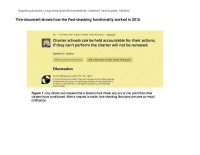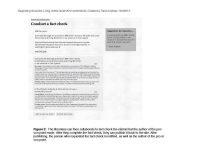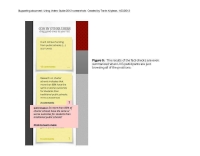Living Voters Guide: Librarians as Fact Checkers
The Seattle Public Library, Wash.
Innovation Synopsis
Through a partnership with CityClub and the University of Washington, The Seattle Public Library provided an on-call fact-checking service on the website of the Living Voters Guide, an online discussion forum of Washington state ballot measures, for three weeks leading up to the election of November 6, 2012.
Challenge/Opportunity
Washington voters were faced with 8 ballot initiatives in 2012. Knowing what the real impact of an initiative is, who to believe, or finding accurate information is a challenge. Living Voters Guide offers a place for users to learn about ballot choices, express their values and concerns, weigh pros and cons submitted by other voters, explore common ground, and reach informed decisions. In response to Living Voters Guide user feedback in 2011, The Seattle Public Library partnered with voter education platform creator, CityClub, in 2012 to answer fact-checking requests from users. Our intended audiences are voters interested in informed and easily accessible dialogue on political issues that affect their daily lives. This project provided an excellent opportunity to further innovative practices and technologies in order to foster civic engagement for voters statewide. This project also provided us with a new public forum to act as an open access civic convener and trusted resource for education and information. This service was provided by librarians in the Business, Science, and Technology unit, with additional support from a project manager funded by the Seattle Public Library Foundation.
Key Elements of Innovation
Determining the scope of the work: when users engage in an online forum, many provide opinion not necessarily supported by factual information. The Library did its early research by examining 2011 election cycle conversations on Living Voters Guide, to classify the different types of comments and which would be verifiable or appropriate for fact checking. This early analysis step was crucial to both informing the participating librarians about the forum, but also to help us determine the length of time needed to answer a typical claim. Setting protocols for responding to questions: once we had a grasp on what could be answerable versus not, the librarians established a process for receiving the questions, collaborating on research for an answer, establishing a time limit (up to two hours of research), and reaffirming existing reference protocols on addressing legal or health related questions. Each answer, before it was posted, was then reviewed by a second librarian to check for clarity, accuracy, and readability. Evaluation of the process and experience: initial feedback came from the participating librarians, who expressed a range of comfort levels in addressing political issues in the public square environment that the Living Voters Guide represents. Further evaluation is underway in collaboration with the University of Washington and CityClub.
Achieved Outcomes
Over the three-week period, librarians responded to 55 requests from 30 distinct users. We learned the following: Providing embedded online reference in a public forum allowed librarians to: • Reach new audiences and connect with the community in a substantial way; • Demonstrate librarians' research skills to the public; • Widen the potential benefit of our services beyond the traditional one-on-one interaction; • Contribute to informed discussion of political issues. The nature of the project also brought up several concerns related to the boundaries of acceptable librarian duties. Some librarians were concerned with the appropriateness of: • Responding to legal questions; • Judging the accuracy of statements; • Risking public perception of bias by involving ourselves in political discussion. Despite these concerns, the Living Voters Guide demonstrated the Library's capacity to provide embedded online reference successfully, and it provides a model for similar projects. The potential benefits of such partnerships are great, and the Library should seek out additional opportunities to provide online embedded reference, but should be careful in planning these services. Any future projects should be designed to ensure that librarians have adequate training, guidelines, and time to conduct in-depth reference assistance. When the Univeristy of Washington completes its research of user participation later this year, we will have a fuller picture of the ongoing value of Library participation and future development of staff and user tools to ensure successful engagement through this voter education tool.



